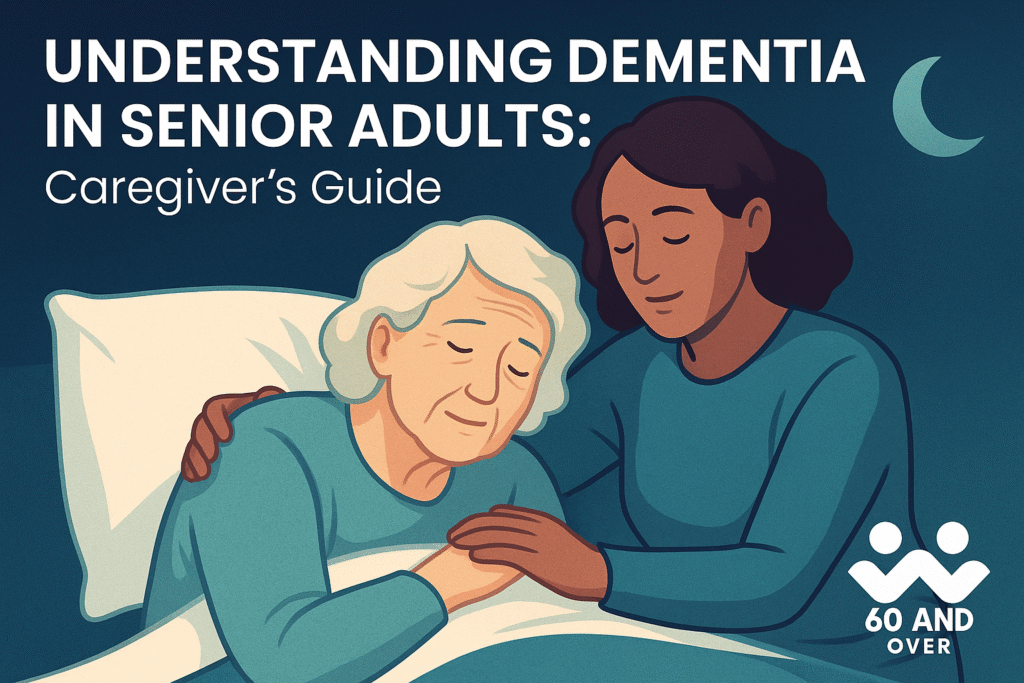Dementia is one of the greatest challenges many families face as their loved ones grow older. It is more than just memory loss—it changes how a person thinks, communicates, and lives. For caregivers, the journey is often filled with both emotional strain and practical responsibilities, from creating a safe environment to finding moments of comfort and connection.
According to the World Health Organization, over 55 million people worldwide live with dementia, and the majority are over the age of 65. In the United States alone, more than six million people are affected by Alzheimer’s disease, the most common type of dementia. These numbers are expected to rise as life expectancy increases.
Behind every statistic are real people—seniors who may struggle with daily tasks, and caregivers who are adapting their lives to provide support. This guide aims to provide clear, practical, and compassionate information on dementia in senior adults: what it is, how it shows up in daily life, and what caregivers can do to help.
What Dementia Is in Senior Adults
Dementia is not one single disease. Instead, it is a broad term used to describe a collection of symptoms caused by damage to the brain. These symptoms affect memory, reasoning, communication, and behavior.
The most common forms of dementia in senior adults include:
- Alzheimer’s disease – Responsible for 60–70% of cases. It begins with short-term memory loss and gradually affects language, judgment, and the ability to perform everyday activities.
- Vascular dementia – Caused by reduced blood flow to the brain, often following strokes or small vessel disease. Symptoms can include slowed thinking, problem-solving difficulties, and mood changes.
- Lewy body dementia – Associated with abnormal protein deposits in the brain. Seniors may experience hallucinations, sleep disturbances, and movement problems similar to Parkinson’s disease.
- Frontotemporal dementia – Affects the parts of the brain responsible for personality and behavior. Seniors may show unusual social behavior, lack of empathy, or language difficulties before memory problems appear.
While dementia becomes more likely with age, it is not a normal part of aging. Many seniors live into their 80s and 90s without dementia. Recognizing the difference between “senior moments” and dementia is key. Occasional forgetfulness is common, but dementia disrupts daily life in ways that cannot be explained by normal aging alone.
Signs and Symptoms to Watch For
The early signs of dementia can be subtle, but they become more noticeable as the condition progresses. Families often begin to suspect something is wrong when daily routines become harder or when unusual behavior patterns emerge.
Common early signs include:
- Frequent memory loss that disrupts daily living.
- Difficulty finding words or following conversations.
- Confusion about time, place, or familiar environments.
- Poor judgment or difficulty with planning tasks like cooking or paying bills.
- Withdrawal from social activities once enjoyed.
- Sudden mood swings or changes in personality.
As dementia advances, seniors may need more assistance with personal care, may lose recognition of family members, or may display repetitive or restless behavior. In later stages, walking, swallowing, and even communication may be affected.
It is important to note that not every memory slip means dementia. Stress, depression, and certain medications can also cause confusion. But if memory and reasoning problems persist or worsen, it is time to seek professional evaluation.
How Dementia Affects Daily Life in Seniors
For senior adults, dementia touches every part of life. Beyond memory loss, the condition alters how they eat, move, and interact with others.
- Eating habits often change. Seniors may forget meals, overeat, or even try to eat unsafe foods. Caregivers sometimes find that mealtime routines must be simplified, with smaller portions and easy-to-handle foods.
- Social interaction becomes more difficult. Conversations may be confusing, and seniors may withdraw rather than risk embarrassment.
- Independence is often reduced. Managing finances, driving, or even remembering to turn off the stove becomes unsafe.
- Safety risks increase. Wandering, leaving doors unlocked, or forgetting to take medication can all create danger.
For caregivers, adapting to these changes often means redesigning the home environment, simplifying routines, and balancing safety with respect for independence.
Among all these changes, sleep problems are one of the most challenging issues caregivers face. Restlessness at night, sundowning, or waking frequently can drain both the senior and their caregiver. While no single approach works for everyone, caregivers can build a supportive sleep routine with consistent steps.
How to Support Better Sleep for a Senior with Dementia
Improving sleep often requires both structure and compassion. These practical steps can help create a calmer night:
- Keep a regular daily schedule.
- Encourage morning light and light exercise.
- Limit caffeine and long naps in the afternoon.
- Create a calming bedtime routine with dim lighting.
- Use nightlights to reduce confusion and falls.
- Respond gently to wake-ups without scolding.
- Review medications and talk to a doctor if sleep does not improve.
- Premuim Material: The weighted blanket is made of soft breathable microfiber material and…
- Recommended Weight Size: Please choose 7%-12% of your body weight which would help you sleep…
- Precise Positioning Technology: The biggest problem of weighted blanket is that as the beads…
- About Size: Weighted blanket is much smaller than ordinary blanket, because it is supposed to…
- ORIGINAL SLEEP SOUND MACHINE: Beloved by millions since 1962, the Dohm was the first white…
- CUSTOMIZED SLEEP EXPERIENCE: The Dohm is designed to adapt to your unique sleep needs. Its dual…
- CRAFTED WITH LOVE: For over 60 years, Yogasleep has consistently set the gold standard in…
- SIMPLE TO USE: Plug in your Dohm using the included 7ft 6in 120V AC power cable, flip the…
Dementia and Sleep Challenges
One of the most frustrating aspects of dementia for families is how it disrupts sleep. Seniors with dementia may nap during the day and then remain awake at night. Others may wake frequently, wander, or become restless.
This disruption is partly due to changes in the brain’s circadian rhythm—the internal “clock” that regulates sleep and wake cycles. Another common issue is sundowning, when confusion and agitation increase in the late afternoon and evening.
Typical nighttime challenges include:
- Restlessness and frequent waking.
- Wandering indoors or outdoors at unsafe hours.
- Hallucinations or vivid nightmares.
- Agitation or resistance to going to bed.
Poor sleep makes dementia symptoms worse, increasing confusion and irritability during the day. It also takes a toll on caregivers, many of whom already face exhaustion.
👉 For a focused look at ways to improve rest, see our detailed guide: Best Sleeping Aid for the Elderly with Dementia.
Approaches to Caregiving
Caring for someone with dementia is demanding, but strategies and preparation can make the journey less overwhelming.
- Communicate clearly. Use simple words, speak slowly, and repeat instructions when needed. Offering choices—like “Would you like tea or water?”—is often better than open-ended questions.
- Maintain routines. Familiar schedules provide comfort and reduce anxiety. Consistency in meal times, bedtimes, and daily activities makes life easier.
- Create a safe environment. Add grab bars, install nightlights, and secure hazardous items. Consider using locks or alarms to prevent wandering.
- Engage gently. Activities like listening to music, folding laundry, or light gardening can be calming. The goal is not performance but participation.
Caregivers must also look after themselves. Burnout is common, and respite care, support groups, or even short breaks can prevent physical and emotional collapse. It is not selfish for caregivers to rest—it is necessary for both them and their loved ones.
Treatment and Support Options
There is no cure for dementia, but there are ways to manage symptoms and improve quality of life.
- Medications can sometimes slow memory decline or help with mood and sleep disturbances, though they do not stop progression.
- Therapies such as occupational and physical therapy can help seniors maintain mobility and daily skills.
- Memory care centers provide structured environments tailored for seniors with dementia, with staff trained to handle confusion and wandering.
- Support groups—both for seniors and caregivers—create a sense of community and shared strength.
Families should also plan for the future. Financial planning, healthcare directives, and discussions about long-term care options are difficult but essential.
Practical Tools and Resources for Families
Caregiving is easier with the right support. Families often find relief in simple tools that increase safety and comfort:
Beyond products, caregivers should connect with organizations like the Alzheimer’s Association, local senior centers, and community health resources. These provide not just information, but also emotional support.
- Nightlights and motion-sensor lamps reduce nighttime falls.
- Bed alarms or door sensors alert caregivers if a loved one wanders.
- GPS trackers offer peace of mind when seniors leave home.
- Meal planning guides and easy recipes help ensure proper nutrition.
- Wireless Monitoring Day and Night: The bed exit alarm features a soft 10″ x 30″ bed pad with a…
- Advanced Caregiver Pager: The included pager offers both vibrate and sound alert options,…
- Expandable Monitoring Network: The pager supports up to six different Smart Caregiver sensors,…
- Reliable Caregiver Alerts: Early alert bed pads can send false alarms, reducing caregiver’s…
- FREE SERVICE FOR 1st MONTH with easy activation. MONTHLY SUBSCRIPTION REQUIRED: $49.99 per…
- PREMIUM ASSISTIVE TECHNOLOGY: Safest solution for autism, special needs & dementia | Offers…
- INTELLIGENT Alerts: Only AngelSense Auto-Learns daily routine for alerts when potentially…
- EMERGENCY SEARCH TOOLS: Share live location, updated in real-time, via text message to your…
Conclusion
Dementia in senior adults is a complex condition, one that touches memory, behavior, and daily living. But while the road ahead may feel overwhelming, caregivers do not have to walk it alone. Understanding dementia makes it easier to respond with patience rather than frustration, to create safety instead of fear, and to find moments of joy even in the middle of difficulty.
Families who face dementia often discover reservoirs of strength they did not know they had. With the right knowledge, resources, and support, life with dementia can still include dignity, comfort, and connection.
Frequently Asked Questions (F.A.Q)
Q1: What is dementia?
Dementia is a general term for a decline in memory, thinking, and problem-solving abilities that is severe enough to interfere with daily life.
Q2: What are the most common types of dementia in senior adults?
The most common type is Alzheimer’s disease, but others include vascular dementia, Lewy body dementia, and frontotemporal dementia.
Q3: How can caregivers tell the difference between normal aging and dementia?
Occasional forgetfulness is normal with aging, but dementia involves consistent memory loss, confusion about time and place, difficulty managing tasks, and personality changes.
Q4: What are early warning signs of dementia?
Warning signs include repeating questions, misplacing items in unusual places, difficulty following conversations, mood swings, and trouble handling money or bills.
Q5: How does dementia affect daily life?
It can impact independence, communication, sleep, mood, and the ability to manage personal care and safety.
Q6: How does dementia affect sleep patterns?
Seniors with dementia may experience sundowning, restlessness, nighttime wandering, and frequent awakenings.
Q7: What steps can caregivers take to support someone with dementia?
Caregivers can establish routines, encourage safe physical activity, reduce environmental stress, use clear communication, and seek professional support when needed.
Q8: When should families seek medical help?
Families should consult a doctor if memory problems worsen, if behavior changes suddenly, or if safety becomes a concern.









